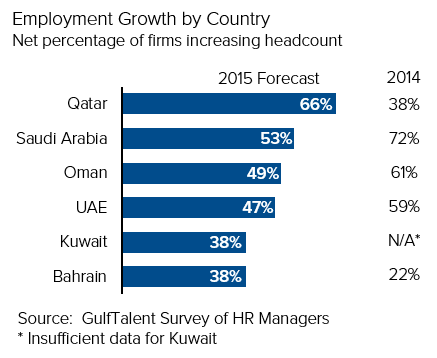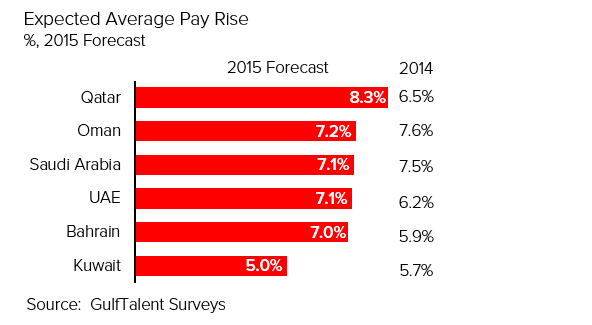Most employers expect to increase headcount. Healthcare fastest growing sector.
GCC private sector salaries to rise 6.9% in 2015. Qatar and Oman top pay rises.
Overall employment across the GCC is on the increase in 2015, despite the fall in oil prices, according to the latest edition of the research report "Employment and Salary Trends in the Gulf" released today by GulfTalent.
Employment growth in 2015
The report found healthcare to be the fastest growing sector across the region, with 82% of employers in the sector increasing their headcount last year and 79% planning to do so in 2015. Key drivers of this growth were found to be massive government investment, the region’s fast-growing population, and regulatory changes in most GCC countries requiring companies to provide health insurance for employees.
Among GCC countries, Qatar is expected to enjoy the highest rate of job creation in 2015. With the uncertainty over the World Cup finally removed and major infrastructure projects getting the go-ahead, 66% of employers in Qatar reported plans to increase headcount.

Impact of the oil price
GulfTalent’s research found that, while the oil price slump had resulted in a slowdown in the oil and gas sector and some cut-backs in Oman and Bahrain, most employers in the region were as yet unaffected by it.
This is consistent with data from Abu Dhabi Commercial Bank (ADCB), which reported a 10% increase in projects awarded across the GCC during the first quarter of 2015, compared to the same period last year. A significant portion of these was comprised of projects awarded in Qatar.
The governments of Saudi Arabia, Qatar and the UAE have this year been drawing on their vast cash reserves to make up for the lower oil revenues in order to meet their planned spending and investments.
Bahrain and Oman have experienced a greater impact, due to their lower reserves and higher dependence on the oil revenue. According to data from the International Monetary Fund, the government of Bahrain needs to sell its oil at $125 per barrel to balance its budget, compared with the current price of oil at $66.
Salary increases
Across most of the GCC, private sector salaries are forecast to rise at a similar pace in 2015 compared with the previous year. Qatar is expected to see the highest average pay increase at 8.3%, driven by rising cost of living and the growing need to attract talent for completion of projects. Employers in Oman, under pressure from an increasingly unionized workforce, are forecast to give the second highest average pay rise at 7.2%.
Saudi Arabia and the UAE are next, with expected average pay rises of 7.1%, followed by Bahrain at 7.0%. Kuwait is expected to see the lowest average pay rise at 5.0%.
Among sectors, construction is forecast to have the highest average salary increase at 10%, while oil & gas sector is expected to be the lowest at 5.4%.

Challenging recruitment environment
Creating jobs for nationals remains a hot issue across the Gulf. Employers in Saudi Arabia and Oman, under pressure from their governments to meet tough nationalization targets, cited attraction and retention of skilled nationals as their biggest human resource challenge.
On the expatriate front, employers across the region are finding it increasingly challenging to attract professionals from India, traditionally a key source of talent for the Gulf. The growth of the Indian economy is leading to more job opportunities and increasingly attractive salaries at home. According to the International Monetary Fund, India is expected to be the world’s fastest growing major economy in 2015, surpassing China’s growth rate for the first time since 1999.
GulfTalent’s report also found that conflicts across the Middle East have led to an increased supply of talent from the affected countries seeking opportunities in the Gulf. However, employers were often frustrated in their attempts to absorb this talent pool, due to restrictions put in place by most GCC governments on granting employment visas to nationals of the affected countries, notably Syria and Egypt.
GulfTalent’s report is based on an online survey of 600 employers and 22,000 professionals, as well as 60 interviews with executives and HR professionals, conducted during the period December 2014 to April 2015. The full version of the report "Employment and Salary Trends in the Gulf 2015" is available for download free of charge from GulfTalent website [See full report ]
